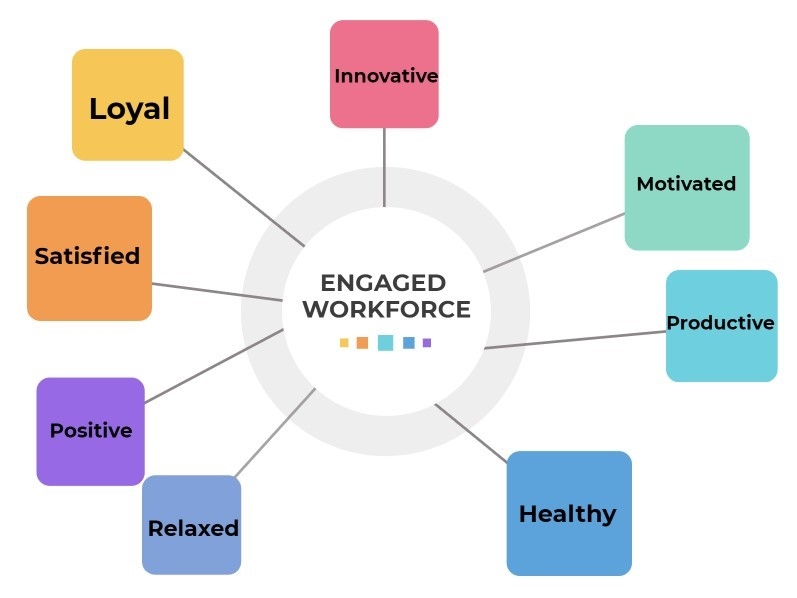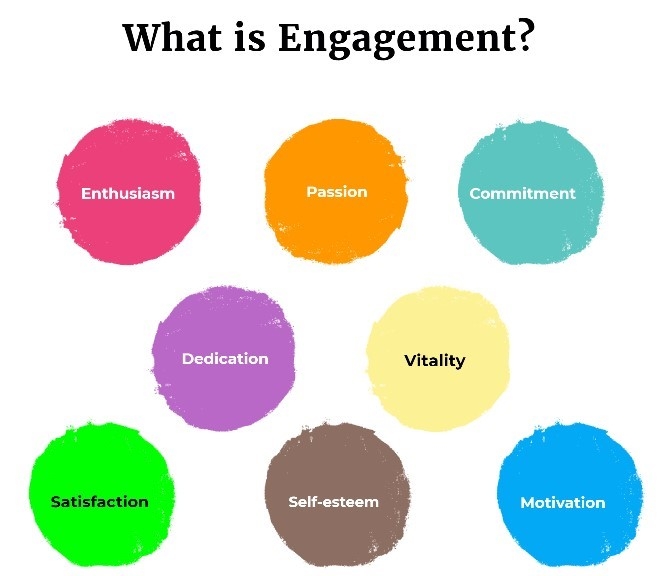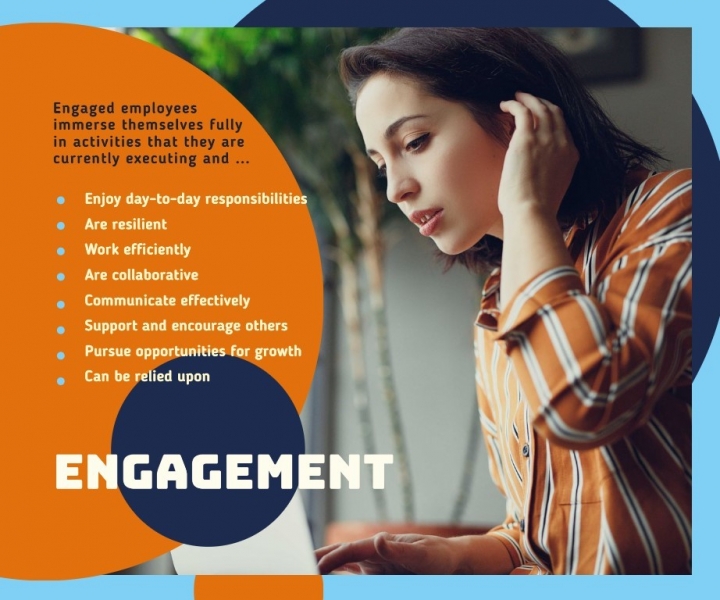The PERMA Model represents the five core elements of happiness and well-being is the acronym for Positive Emotion, Engagement, Relationships, Meaning, and Accomplishments.

In this unit, we will explore the letter E for Engagement and explain:
- why Engagement is important to achieve happiness in the workplace on an organizational/managerial level
- the impact of Engagement on the happiness of employees
- two key theories and relevant tools are related to Engagement and why they are important to achieve happiness at work
How many times has it happened to us to say or to hear someone saying “Sorry, I cannot talk now as I am engaged in another conversation” or “Studying engages me a lot lately” or also “I am engaged with a very important project” or “The President decided to engage in military operations against rebels”?
Well, we do know that these statements mean that we (or others) are investing efforts, resources, time and concentration in something that we are deeply focused on and involved with. And we may be so much absorbed in it that we are not even prepared to pay attention to anyone or anything else while somehow we are also losing sense of time.
Well, that is “engagement”: it is a behaviour or a mental-psychological mood and state of mind characterised by positive feelings and fulfilling sensations that make us feel fully involved, committed and enthusiastic.
If we focus on engagement within work environments, “engaged workers” (including employees and managers) are definitely committed, passionate and inspired as well as inspiring for others, becoming more productive, more aware of their own strengths and increasing their self-esteem.
According to the PERMA model (Positive Emotions – Engagement – Relationships – Meaning – Accomplishment) developed by Dr Martin Seligman, wellbeing of employees and managers is the key contemporary factor to improve everyone’s resilience, individual and collective professional success and therefore mental as well as emotional health to prevent illnesses and frustrating prolonged situations.
In this frame, we will focus just on Engagement that according to the PERMA model is related to the abilities to “perform better” to be “more intrinsically motivated” as it “reduces feelings of depression and increases feeling of wellbeing”.
Why? Because engagement helps us be “mindful” and therefore enjoy the activities that we are involved in and focused on. This feeling of living in the present is the so-called “flow”.
Mindfulness and the state of flow are the key features of engagement that we will explore and train through effective strategies, activities and tools.
As it happens in every day personal lives, engaged workers in a happy and serene working environment can:
- boost cooperative and fruitful relationships among colleagues and with their managers
- improve efficiency and productivity with more profits for the company and therefore produce a long-term feeling of safety in the employees who will contribute with better quality results
- develop and consolidate consistent and fruitful team work results by engaging all members towards a “one team” culture
- connect all employees with their own and the company’s purpose, vision and mission
- enhance effective strategies to reach companies’ missions through energetic and enthusiastic collaborators
- create a generative environment through an open dialogue where everyone has a voice and input into driving solutions
- improve customers’ satisfaction.
Therefore, it is crucial for managers to have engaged employees who are fulfilled and happy both at work and in their lives.

Well, there are specific effective strategies to boost employees’ engagement first of all by establishing positive employee-manager relationships related to:
- effective leadership to motivate employees’ commitment as good management is critical
- open, honest and frequent communication to boost trust in your employees
- positive corporate culture to motivate your employees to come to work every day with a positive and constructive attitude
- deserved rewards and recognitions for employees since meritocracy is the key to companies’ success rewarding directly the behaviours and quality results of their employees
- employees’ professional and personal growth as they will be much more engaged if they are given the opportunity to run new projects or take new responsibilities
- their involvement as active counterparts in the achievement of companies’ mission and vision since a clear and shared statement of core company values helps employees feel they are part of a big picture they fit into
- the company corporate social responsibility since employees’ engagement will be higher if they know they can actively give significant contributions to worthy causes for the community through their organisation
According to what already stated, we may conclude that engagement is the ability to be present, focused and enthusiastic and this positive attitude based on mindful awareness of the present that determines an advantageous flow of experiences produces unexpected further benefits such as the achievement of higher quality and quantity results.
Engagement can really boosts motivation and productivity and make people happier in their daily lives. According to Wrzesniewski et al. (2002), employee engagement is important to understand because work is a pervasive and influential part of a person's welfare, shaping not only his or her quality of life, but also his or her health, mentally and physically. (Organizational success: how the presence of happiness in the workplace affects employee engagement that leads to organisational success, by Kevin K. Claypool April, 2017, page 31).
When we are engaged at work and concentrated on something that we enjoy, time flies, the activity itself seems less hard and more fulfilling, we are happier to go to work and do not feel burned out or stressed. More importantly, we are happy to go back home and dedicate our personal time to the family or hobbies as we do feel rewarded by our professional achievements.
This overall feeling of engagement has significant implications on employees’ professional life as they:
- are much more satisfied while carrying out tasks and after having accomplished them
- become aware of their strengths in facing and overcoming challenges
- trust peers and / or managers and look for resources (whether through colleagues or study material) to accomplish their tasks
- feel secure in their role, invest in their job and care about the success of their team/s
- become more and more committed to their organisation's mission and to achieve it
- discover their own potentials that may be the ability to manage time or prioritise their tasks or plan “smart” goals to successfully complete a task
- are much happier in their private lives as they don't complain about their job, have the energy to play with their kids after work, and generally contribute to a positive home atmosphere

























